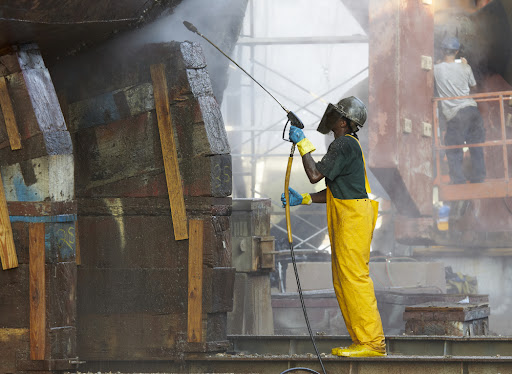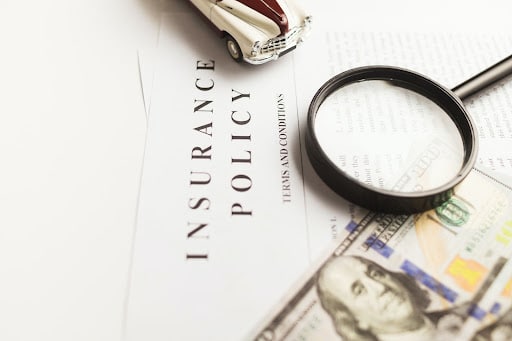
Do You Need Pressure Washing Insurance?

Pressure washing takes a special mix of skills. When you do the job, you’re combining heavy-duty water, chemicals, and machinery — a dangerous combination in the wrong hands.
Luckily, there are people like you who know what they’re doing and love doing it. So, they start a pressure washing business to keep others (like most of us) from hurting ourselves and our property.
Even with the incredible talent and know-how you have, anything can happen on the job.
Insurance is necessary to protect you as the business owner (and the person ultimately responsible for any harm). The question is, what kind of coverage do you need?
The pressure washing field doesn’t have any requisite or nationwide education programs, certifications, or insurance. Most states will require a business license before you can start collecting money, however.
There are some must-have insurance policies anyone dealing with other’s property should have, and a few that are just wise investments along with a state business license.
We have you covered in this article with everything you should know about getting pressure washing insurance for your small business.
Learn how to obtain self-employment insurance in your field:
Freelance Disability Insurance | Freelance Ghost Insurance | Freelance Workers Comp Insurance | Freelance Critical Illness Insurance | Freelance E&O Insurance | Freelance Airbnb Host Insurance | Freelance Commercial Auto Insurance | Freelance Commercial Property Insurance | Freelance Utah Home Insurance | Freelance Amazon Flex | Freelance Carpet Cleaning Insurance | Freelance Window Cleaner Insurance | Freelance Electrician Insurance | Freelance Mechanic Insurance | Freelance Junk Removal Insurance | Freelance Bartender Insurance | Freelance Hair Stylist Insurance | Freelance Barber Insurance | Freelance Taskers Insurance | Freelance Web Designer Insurance | Freelance Doordash Driver Insurance | Freelance Uber Driver Insurance | Freelance Plumber Insurance | Freelance Writer Insurance
Why You Need Insurance for a Pressure Washing Business
Call it Murphy’s Law or chalk it up to a bad day. For whatever reason, accidents always seem to happen at the worst time.
Every day you’re on the job as a pressure washer there’s potential for an incident to occur.
It’s impossible to prepare for every eventuality on a job site.
Your employee could trip on a crack in the driveway.
A dog might run into the building and knock over the ladder you’re standing at the top of, hurting you and damaging your customer’s property.
Or a natural disaster happens overnight, destroying the building you’re working on with all your equipment inside.
And don’t forget about your client’s expensive possessions that you or your employees could accidentally damage.
Pressure washing can be similar to working on a construction site. Equipment may be laying around, sneakily waiting for someone to trip over it; puddles of water pool silently, ready to wreak havoc.
Ahead, we’ll discuss why insurance coverage is your best bet.
An Ounce of Prevention is Better Than a Pound of Cure
These scenarios are not just pessimistic, “glass-half-empty” what-ifs. These are real scenarios that require proactive attention.
It’s your professional responsibility to be proactive about possible minor accidents and major catastrophes as a business owner, which means getting proper insurance.
The right pressure-washing business insurance policies will keep you from being held liable in situations like those above.
Without coverage, you’ll have to pay for any damages yourself. They could be minor, like a cracked window, or massive, with permanent bodily injury or a destroyed home attached to the incident.
One mistake or uncontrollable disaster could put you out of business and into dire financial straits for years.
Instead, you could pay a few hundred dollars each month for insurance coverage and hope you never need to use it.
What Kind of Insurance Do You Need for Pressure Washing?

You’ll want to have insurance that covers your property and assets from financial loss. You also need insurance to cover your employees and clients as well. Make sure your policy limits are enough to protect those you do business with.
Let’s talk about the kind of insurance that’s available and what each one covers with those goals in mind.
General Liability Insurance
Commercial general liability coverage gives the policyholder (you) protection from what are known as third-party risks.
In other words, if an issue includes another person (a third party), it’s likely covered in this category.
This liability policy kicks in when accidental property damage, bodily injuries, or libel/defamation lawsuits occur. Some of these claims may fall into the realm of professional liability, also called errors and omissions insurance.
You don’t need this coverage since you aren’t offering advice on other people’s money or healthcare. Still, a BOP (business owner policy) is an excellent way to get extra protection through bundling coverage.
BOPs include general and business liability but also let you customize your insurance. A combo policy includes things like commercial property insurance, liability, peril, business interruption, and more.
Workers’ Compensation Insurance (If Applicable)
Are you the only pressure washer or worker in your business? If so, you can skip this section. But if you have at least one employee, this coverage is mandatory in many states.
Workers comp insurance covers damages if you or your employee is injured while performing a job-related duty. Check with your state to find out when you’re required to carry this policy.
Anyone who doesn’t comply with the mandated coverage can face expensive fees and penalties. In addition, any employee injury expenses will default back to you for medical payments and compensation, as well.
Commercial Auto (If Applicable)
Do you use a vehicle to transport your pressure washer and other equipment to your customer? If so, be sure to carry commercial auto insurance.
Your insurance provider may deny any claims from an accident when you were on a business mission, even on your personal car or truck. Talk to your carrier to see if they can include commercial coverage in your policy.
Janitorial and Equipment Bonds
No one wants to think their employees are thieves. Your business’s reputation is on the line, and a janitorial bond is an inexpensive way to protect it.
If a customer accuses one of your employees of stealing their possessions or money, you’re going to find yourself in a tight spot; your pressure-washing business insurance doesn’t cover theft. It also likely excludes intentional damage to your client’s property (vandalism).
A bond acts as an insurance policy. You pay a fee to buy a bond that’s worth X amount of money. Then, if you ever need it, you can access up to that value to cover the theft accusation.
Many businesses will ask you for a certificate of insurance before they hire you. If you can take on higher-paying clients and get more work, it’s worth the insurance cost.
Many companies will give you a free quote for your small business insurance needs.
Subscribe To SelfGood
Get up to date perks and Gigworker news. Easy. Simply. SelfGood. Subscribe.
Where Can You Get Pressure Washing Insurance?
Now that you know how serious the concern of insurance is, where can you find the best policies?
Part of this answer depends on your budget and needs. Working with an insurance agent is a way to get multiple quotes without filling out the same information over and over.
Policy Coverages and Requirements Vary
Insurance carriers offer different services, policy limits, and riders (additional coverage choices).
They also vary in the types of requirements the underwriter looks at to see how much your premium will be and if you qualify.
It’s not uncommon for an insurer to check your personal and business creditworthiness and previous history of filing claims.
A low credit score and high claim count don’t necessarily preclude you from coverage, though it may increase your monthly premium.
Tips to Reduce Your Premiums
Higher policy limits and a lower deductible also raise how much you pay for coverage.
Holding enough cash on hand to pay a high deductible will keep your monthly payment down, though it may be best to pay a few extra dollars per month to decrease your deductible.
Paying for your policy in full to your insurance company also reduces your cost. You can potentially save yourself hundreds of dollars per year by making one lump sum payment every six months.
Whatever you do, get an insurance quote from multiple business insurers.
Are There Any Other Insurance Policies I Should Be Thinking About??

The search for ways to protect your pressure washing company doesn’t stop with your job, though.
What happens if you get sick and there is no one to step in and cover you? You’ll have to cancel the jobs on your schedule, and you don’t get paid for sick days.
Health Insurance
That’s where healthcare insurance is helpful. Head over to the Marketplace and sign up for reputable coverage with low premiums. Your medical expenses will be (mostly) covered, and you’ll probably even have free or low-cost wellness care.
You might have a high deductible, and that’s fine. You can use Selfgood’s supplemental indemnity services to fill in the gaps.
Disability
The pressure washing services you provide aren’t easy. If you’re hurt outside of the job or get sick for more than a couple of weeks you won’t be able to work.
A BOP policy has business interruption insurance. This feature covers you when you can’t operate your business because of fires or other disasters. But it doesn’t kick in if you can’t do your job due to sickness or illness.
That’s where disability coverage is handy. You can pick short-term or long-term disability insurance or both. Every plan will have its pros and cons.
Short-term is cheaper, but it only pays for a year or two. Long-term can pay out your benefits for decades, but your disability has to be at least a few months along before it starts paying.
The golden combination is to invest in a short- and long-term policy and cross your fingers you don’t need either one.
Life Insurance
Disability coverage helps your family keep a roof over the head when you’re sick or hurt. Who will care for them if you’re not around anymore, though?
Life insurance gives you the peace of mind of knowing that your loved ones aren’t stuck with your expenses. They won’t need to work extra or risk losing their house if you lose your life.
At a minimum, you can carry a small policy with enough of a benefit to pay for your funeral and burial expenses. For $20-$30 more each month, this amount bumps to a sum that will get your family through a couple of years without you.
With life insurance, you get two choices: whole and term.
Whole insurance is more expensive and harder to qualify for. The underwriter is approving you for one rate for the rest of your life, so they want to ensure you’re pretty healthy and you don’t take a lot of unnecessary risks.
Term insurance is usually recommended by financial gurus. It’s just enough to cover your expenses while you’re still providing for your children, and its terms out in about 20 years when they’re (hopefully) on their own.
Because it’s temporary, and the odds are pretty good that you’ll live longer than the policy’s active status, you can get term insurance for pennies on the dollar.
Conclusion
Starting a pressure or power washing business can be an exciting and lucrative opportunity. But just like any other type of small or independent business, it comes with a unique set of risks.
Fortunately, you can protect yourself, your employees, and your customers (along with your pressure washing equipment) by having the right type of insurance for your power washing business.
Are you thinking of joining the ranks of pressure washing contractors or transitioning into self-employment? You’re not alone: join Selfgood for an incredible set of tools and exclusive savings on everything you’ll need to be successful.





